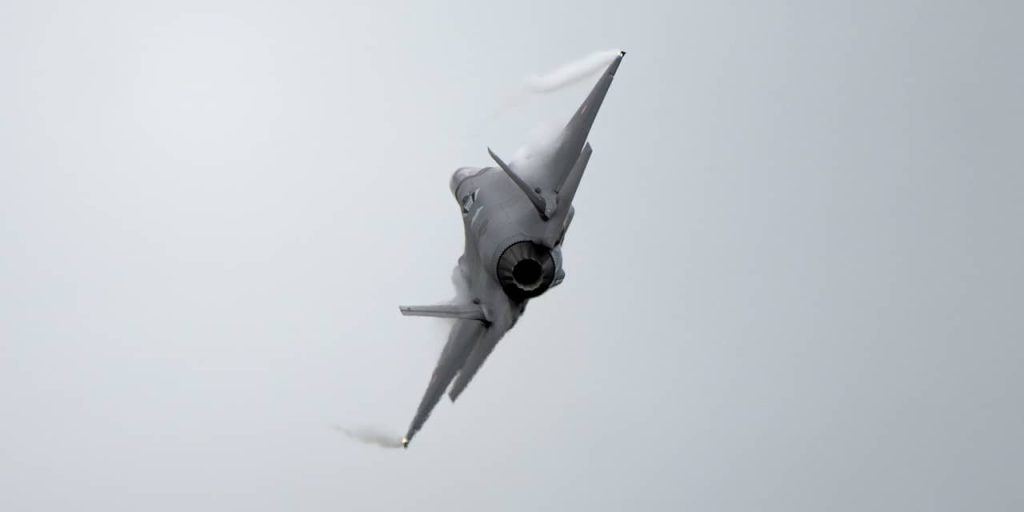Defense giant
Lockheed Martin
turned in a solid quarter as global tensions rise and the war between Israel and Hamas intensifies. Conflict has boosted shares, and Tuesday’s results should help keep the price stable.
Before the opening bell, Lockheed (ticker: LMT) reported third-quarter earnings per share of $6.73 from sales of $16.9 billion. Wall Street was looking for earnings per share of $6.67 from sales of $16.7 billion, according to FactSet. A year ago, Lockheed reported earnings per share of $6.87 from sales of $16.5 billion.
The stock was down about 1.5% in premarket trading. Futures on the
S&P 500
and
Dow Jones Industrial Average
were down about 0.5% and 0.2%, respectively.
Earnings will impact the regular session, and so will developments in the Israel-Hamas war. Shares are up about 10% since the attack on Israel a little more than a week ago.
Free cash flow was a highlight, coming in at $2.5 billion, above Wall Street’s estimate of $1.7 billion. Backlog finished the quarter at $156 billion, just down from a record $158 billion at the end of the second quarter.
The numbers look solid. Vertical Research Partners analyst Rob Stallard called the quarter “surprise-free” in a Tuesday report, adding he expected shares to be little changed based on third-quarter numbers. The war, of course, makes calling the reaction to defense earnings tricky this quarter.
“Our third quarter results were at or above our expectations across the board, generating $2.5 billion of free cash flow, with nearly 100% returned to shareholders through dividends and share repurchases.” said CEO Jim Taiclet in a news release. “Both domestic and international orders were strong. Moreover, our 21st Century Security strategy is resulting in new business successes.”
The company bought back $1.8 worth of stock in the third quarter and increased its share repurchase authorization by $6 billion, bringing the total authorization for potential future stock repurchases to $13 billion.
With one quarter left in 2023, financial guidance was reaffirmed. Management still expects to generate earnings per share of about $27.10 from sales of about $66.5 billion. That leaves about $7.22 a share and $18 billion in sales for the fourth quarter. Wall Street is currently projecting $7.28 a share and $18.1 billion in sales.
Investors might view implied fourth-quarter guidance as conservative, but there isn’t much to complain about. J.P. Morgan analyst Seth Seifman wrote in a report previewing earnings that investors should pay attention to margin pressure, arising from inflation, new programs, and supply chain concerns.
Some pressure is evident, but he modeled operating profit margins of 11%. Margins came in about 12%. A year ago, operating profit margins came in at about 13%.
Management will host a conference call at 11 a.m. Eastern to discuss results.
On the call, investors will want an update about the next-generation F-35 jets that Lockheed isn’t delivering yet. Those are called TR-3 for the third time technology has been refreshed. Slowing deliveries doesn’t really impact earnings since Lockheed recognizes sales and profit as planes are built, but it does affect cash flow.
Chief Operating Officer Frank St. John tells Barron’s that the company is still on track to begin delivering the refreshed technology between April and June 2024. That’s the same time frame provided in the company’s second-quarter update.
Options markets imply that shares will move about 3% up or down following earnings. Shares have moved an average of 4% over the past four quarterly reports, rising three times and falling once.
Coming into Tuesday trading, Lockheed stock was up about 11% over the past 12 months. The S&P 500 and Dow Jones Industrial Average were up about 19% and 13%, respectively.
Lockheed shares are up about 10% since war broke out between Israel and Hamas.
Wall Street, for the most part, doesn’t believe the current conflict will be a material sales boost to the U.S. defense sector. Analysts do think it can help change investor sentiment about defense stocks, though. Shares have lagged behind the broader market for the past few years as investors worried about government deficits creating budget pressures.
Write to Al Root at [email protected]
Read the full article here





